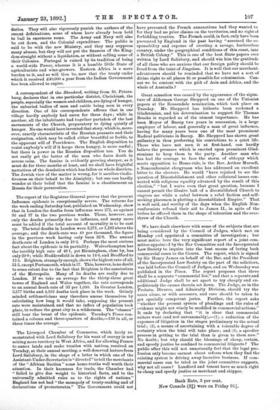We have dealt elsewhere with some of the subjects that
are being considered by the Council of Judges, which met on Monday and appointed a committee of investigation; but must notice here the very significant report of a joint com- mittee appointed by the Bar Committee and the Incorporated Law Society to inquire into the best means of luring back commercial cases to the Courts. The report, which is signed by Sir Henry James on behalf of the Bar, and the President of the Incorporated Law Society on the part of the solicitors, was laid before the Council of Judges, and on Wednesday was published in the Times. The report proposes that there shall be a separate "commercial list," and that a separate and additional Judge shall be set apart to try cheaply and ex- peditiously the causes therein set down. The Judge, as in the Probate, Divorce, and Admiralty Division, should try the cases alone, or with assessors, and care should be taken to get specially competent juries. Further, the report asks "whether the present system of pleadings and the rules of evidence might not wisely be modified in commercial actions." It ends by declaring that "it is clear that commercial suitors want (and not unreasonably),—(l), a reduction of the expenses of litigation in the stages preliminary to the actual trial ; (2), a means of ascertaining with a tolerable degree of certainty when the trial will take place ; and (3), a speedier process in getting to the trial than is given to them now." No doubt ; but why should the blessings of cheap, certain, and speedy justice be confined to commercial litigants ? The public after this will not unnaturally feel that the legal pro- fession only become earnest about reform when they find the existing system is driving away lucrative business. If com- mercial cases can be tried as the joint committee suggests, why not all cases ? Landlord and tenant have as much right to cheap and speedy justice as merchant and shipper.


































 Previous page
Previous page